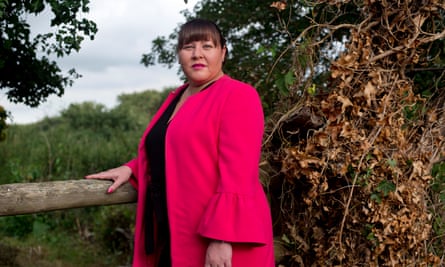
“I’ve got nothing. I’ve worked for 26 years and the only asset I have is my pension. I have no savings, no home and my credit rating is destroyed because of the credit cards and loans he took out in my name. Everything I thought we owned, we didn’t.”
Two years ago, Ruth Dodsworth, a television journalist and weather presenter, gave a number of interviews disclosing that she had been a victim of domestic abuse. For almost a decade, her now ex-husband Jonathan Wignall phoned her up to 150 times a day, tracked her movements and was physically abusive.
In 2021, Wignall was sentenced to three years in prison for stalking and coercive or controlling behaviour. He served 18 months. Dodsworth claims he continues to pursue her for half her pension.
It’s only now, however, that she is speaking out about the economic abuse that she also experienced, to help others. She says she failed to understand the implications of what was happening to her at the time.
She told the Observer: “I’ve a degree, yet I didn’t have my own bank account. You think, ‘How can that have happened?’
“He took every penny of my salary. If I asked for money for lunch at work, he would give me exactly £3 for a Tesco meal deal. Work colleagues asked me for lunch and I’d have to make excuses, so the isolation increased. I never saw mail or bills.
“I didn’t realise economic abuse was part of coercive control. I certainly didn’t realise it would have ramifications for the rest of my life. ”
Dodsworth is one of a number of women whose experiences feature in an important report, Seen Yet Sidelined, published on Monday by the charity Surviving Economic Abuse (SEA). The report analyses 810 successful prosecutions of the offence of coercive or controlling behaviour that have been reported in the media over the eight years since it became a criminal offence in 2015 in England and Wales.
‘I got a brain injury and a life sentence’: the hidden legacy of male violence against womenRead more
Even in 2015, financial abuse – defined by SEA as control of money and finances – and economic abuse – described as control of the resources that money can buy, such as food, clothes and mobile phones, as well as the sabotaging of career prospects – was not explicitly recognised in law as part of coercive or controlling behaviour. Largely as a result of SEA’s campaigning, that was rectified in the Domestic Abuse Act 2021.
In Seen but Sidelined, two-thirds of the 810 cases reference economic abuse and half also feature physical abuse. While the report focuses only on cases published in the press, it gives an indication of how police, agencies and the courts are responding – or not – to the offence. Strikingly, in only 2% of the cases did survivors receive any compensation for their losses. Yet in seven of the cases the total debts amounted to £174,000.
“Economic abuse used to go undocumented and unpunished,” said Nicola Sharp-Jeffs, the founder and chief executive of SEA.
“It is better recognised now, but awareness by victim-survivors themselves is poor while police appear to rank economic abuse at the bottom when assessing risk. Yet in two of the cases in the report, the perpetrator was found guilty of manslaughter – a context of such control that the victim felt she had no choice but to take her own life.”
In the cases in the report, three-quarters of those convicted received a custodial sentence. Although the offence carries a sentence up to five years, the mean length of time spent in prison was only 23 months. If additional offences were also proved (for example, stalking or criminal damage), the average length of sentence was 47 months. Three life sentences were given.
The conclusion that the report draws is that coercive or controlling behaviour in England and Wales is viewed less seriously than other domestic abuse offences and may be downgraded further by plea bargaining. The wording of the law also means that coercive or controlling behaviour is seen as a standalone crime, instead of being part of an overarching offence in which sexual, physical, economic and psychological abuse play constituent parts, as it is in the Scottish system.
 View image in fullscreenNatalie Curtis: ‘My husband had made me financially destitute. I couldn’t even afford the diesel to get to work.’ Photograph: Sophia Evans/The Observer
View image in fullscreenNatalie Curtis: ‘My husband had made me financially destitute. I couldn’t even afford the diesel to get to work.’ Photograph: Sophia Evans/The Observer
In Scotland, because it is seen as a gendered crime, it does not include family members as the England and Wales legislation does, and carries a prison sentence of up to 14 years.
“Survivors tell us that coercive or controlling behaviour is the most dangerous aspect of their abuse,” said Dr Cassandra Wiener, author of Coercive Control and the Criminal Law. “Yet the five-year [prison sentence] cap reinforces the message that there is a hierarchy of harm, with physical abuse at the top and coercive or controlling behaviour at the bottom.”
In one case in the SEA report, the perpetrator caused the victim to build up £50,000 in debts; in another, the perpetrator gave his partner a weekly allowance of £15 in 2p pieces. “He financially rinsed me,” one victim said.
How can that happen? “Coercive behaviour is a course of conduct, not a single event such as a physical assault,” Wiener said. “A victim is subject to the arbitrary control of the perpetrator, deprived of all rights and stripped of her autonomy. The victim is terrorised by a fear of what might happen to herself and her children if she fails to comply to rules that often change constantly. It’s as if she’s in a permanent state of siege.”
Irya (not her real name) had risen to a senior position during nearly two decades in global banking when she married her husband in 2016. A month before, he had attacked her. “It was a big wedding,” she said. “I couldn’t call it off.”
Over the next two years, she was hospitalised several times, suffering brain damage. In 2019, her husband was convicted of coercive or controlling behaviour. He was sentenced to two and a half years and was released after six months.
“That’s what £750,000 worth of lawyers buys you,” Irya said. “When I was with him I had to pay for everything in the house. He wouldn’t allow me hot showers. Physical abuse was always the response if I objected. It only stopped in 2018 when I thought he was going to kill me. The implications of my economic abuse, that have unfolded since, I couldn’t have foreseen.”
Five years on, Irya is homeless, unemployed and, because of markers on her credit rating, cannot get a job in banking, a mortgage, a mobile phone contract or a car lease – all impediments to her new business. “I was trapped. He wouldn’t agree to selling the house, the building society wouldn’t let me rent without his permission. He stopped paying his half of the mortgage. I had to pay £20,000 each time a barrister went to court to push for an order of sale on the house. I had to sell my jewellery and my personal possessions. I was sleeping in my car. I explained to my building society but it constantly harassed me.
 View image in fullscreenCampaigner Nicola Sharp-Jeffs says the police do not treat economic aspects of abuse with sufficient seriousness. Photograph: Andrew F Spicer
View image in fullscreenCampaigner Nicola Sharp-Jeffs says the police do not treat economic aspects of abuse with sufficient seriousness. Photograph: Andrew F Spicer
“Protocols exist. It should have treated me as a ‘vulnerable customer’ but to this day it has failed to recognise my situation. Its harassment has turned me into a nervous wreck. It’s almost as bad as the original abuse.”
Protocols do exist, as does legislation that would permit victims to be compensated, and the SEA website lists the steps a woman experiencing the aftermath of economic abuse can take. Allied Irish Bank, for example, provides personal loans to those who have a poor credit score as a result of to domestic abuse.
Natalie Curtis, a health and safety manager, spent six years with her now ex-husband. He insisted that all loans, bills and credit cards be in her name because he was self-employed. These included a £20,000 loan which he immediately transferred to his own account and a £60,000 BMW car bought on credit. He was physically abusive, destroyed her property and called her dozens of times a day. In 2018, he was sentenced to three years for coercive or controlling behaviour, one of the first convictions under the new offence.
“He had made me financially destitute. I couldn’t even afford the diesel to get to work. I had kept a diary and recorded his behaviour,” Curtis said. “I did it for my own sanity because he kept telling me I was mentally ill and ‘over the top’, but it helped in his prosecution.”
Curtis claims that the perpetrator left her with £80,000 worth of debt. Supported by SEA, she utilised the 2021 Financial Abuse Code of Practice, a banking industry initiative, and worked with the specialist domestic abuse team at Lloyds Bank so that the majority of loans that her ex-husband had taken out in her name were eventually returned to her account. “It took a long time but it was life-changing for me. Five years on, I’m debt-free, but I was hoping to buy a house and I discovered there was a county court judgment against me for a parking fine. He racked up thousands of pounds’ worth of fines.”
Curtis is now a domestic abuse campaigner.
The Observer view on domestic abuse: thousands of women in England and Wales are being refused refuge | Observer editorialRead more
Among the many recommendations the SEA report makes is to follow the Canadian example and establish restitution orders. “They can address a victim-survivor’s credit history or rating,” Sharp-Jeffs said. “It is vital to find a solution so that a woman’s own creditworthiness is reflected and not the abuse she experienced.”
SEA is also lobbying for the victims and prisoners bill currently going through parliament to place a duty on public bodies to provide economic advocacy services as part of victim support. SEA also wants to see mandatory training on economic abuse for police and criminal justice agencies.
“I found bags and bags of unopened letters and bills,” Dodsworth said. “But as far as the police were concerned, the economic abuse was a sideline, a minor interest.”
Other SEA recommendations include a government fund to recompense survivors for debts until the perpetrator can foot the bill; an audit of an offender’s assets (rarely implemented in the 810 cases in the report); and better government collaboration with financial institutions so evidence can be more easily gathered. SEA believes that awareness of economic abuse should be taught in schools and research conducted into how factors such as religion, disability and honour-based violence relate to economic abuse cases.
Dodsworth, who has since remarried, said: “If I hadn’t left when I did, he would have killed me on that night or the next. I’m in a far happier place now, but I have nothing to leave my children. For someone who has worked all her life, that’s a bitter pill to swallow.”

